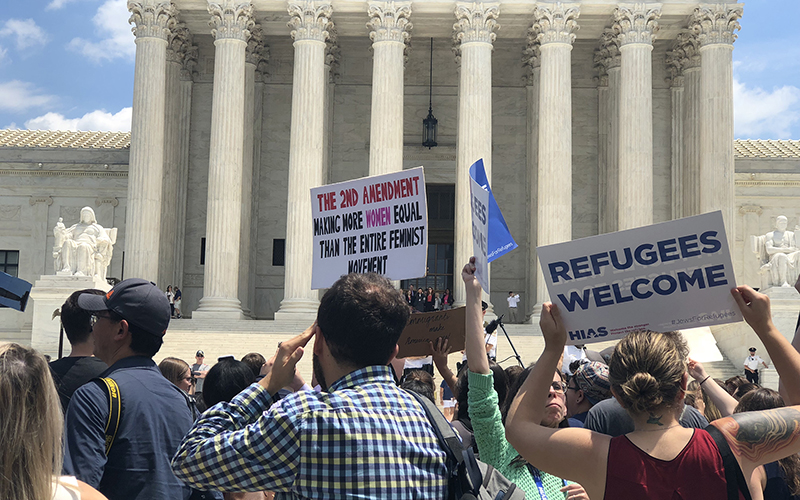
Crowds gathered outside the Supreme Court Tuesday to debate the court’s rulings that upheld President Donald Trump’s travel ban and rejected a California law on pregnancy crisis centers. (Photo by Dani Coble/Cronkite News)
WASHINGTON – The Supreme Court handed down major rulings Tuesday on pregnancy centers and on President Donald Trump’s travel ban, but protesters outside the court were determined to have the last word.
Small crowds that turned up Tuesday morning had swelled to scores by midday, as advocates turned out after the surprise decisions on what is likely the second-to-last day of term for the court. The debates were loud and lively, but generally well-behaved.
It started with pro-life and pro-choice protesters there to argue over the court’s ruling in National Institute of Family and Life Advocates v Becerra, a challenge to the California law that requires pregnancy centers to provide information about state-supported, low-cost health care services, including abortions.
The court ruled 5-4 that the law infringed on the First Amendment.
“This is a huge win for life and a huge win for free speech,” said Michele Hendrickson, of Students for Life America.
Related stories:
 • Supreme Court ruling on travel ban stuns Muslim communty
• Supreme Court ruling on travel ban stuns Muslim communty
• Anti-abortion advocates hail pregnancy center ruling as free speech win
She was one of a small group of pro-life advocates speaking outside the court Tuesday as a slightly larger – and louder – group of pro-choice protesters waved signs and shouted “Stop lying to women.”
The biggest crowds showed up after the court ruled in Trump v. Hawaii, a challenge to President Donald Trump’s executive order that restricted travel from a number of majority-Muslim countries.
The court, split on the same 5-4 vote, said there was nothing in the order that exceeded the president’s authority to restrict admission to the country if he perceives a threat to national security – despite Trump’s often-repeated campaign pledge to stop Muslim immigration to the U.S.
“I am heartbroken,” said Isra Chaker, a Syrian American who said she is the refugee campaign manager of Oxfam America. “It’s taking so much in me to hold back the tears. I want to cry.”
Shortly after taking office, the president suspended immigration from Iran, Iraq, Libya, Somalia, Sudan, Syria and Yemen. When that order was challenged in court, a second was issued that dropped Iraq but restricted the other six.
A third proclamation followed listing Chad, Iran, Iraq, Libya, North Korea, Syria, Venezuela and Yemen, after a review by government agencies of risk factors presented by various countries. That proclamation allowed for review of the countries’ status – Chad was subsequently dropped – and exceptions for individuals on a case-by-case basis.
But critics said the national security justification was just an excuse, and that Trump’s “anti-Muslim animus” made the proclamation unconstitutional because it was directed against one religion.
Chief Justice John Roberts, writing for the majority, disagreed.
“The issue before us is not whether to denounce the statements,” Roberts wrote of Trump’s comments. “It is instead the significance of those statements in reviewing a Presidential directive, neutral on its face, addressing a matter within the core of executive responsibility.”
-Cronkite News video by Dani Coble
Roberts said Trump’s order was “expressly premised on legitimate purposes: preventing entry of nationals who cannot be adequately vetted and inducing other nations to improve their practices. The text says nothing about religion.”
But Justice Sonia Sotomayor, writing one of two dissents in the case, said the justifications for the order were little more than “repackaging” of the president’s anti-Muslim bias as a national security issue.
“It (the ruling) leaves undisturbed a policy first advertised openly and unequivocally as a ‘total and complete shutdown of Muslims entering the United States’ because the policy now masquerades behind the facade of national-security concerns,” Sotomayor wrote. “Based on the evidence in the record, a reasonable observer would conclude that the Proclamation was motivated by anti-Muslim animus.”
Lawmakers who gathered outside the court vowed to reverse travel ban.
“If the Supreme Court is going to do this, it is up to Congress to pass the freedom of religion act that bans any law that prohibits anyone coming to this country because of their religious views,” said Rep. Don Beyer, D-Virginia. “We have to overturn what the Supreme Court has done. We cannot let this stand.”
The court also overturned the California law that required pregnancy centers, which are generally pro-life, to provide clients information about state-supported, low-cost health care services, including abortions. That law also required that pregnancy centers that are not licensed to provide medical services disclose that fact.
Lower courts refused to block the law, but the high court overturned those rulings after finding that the law infringed on the centers’ First Amendment rights by forcing them to engage in speech they objected to.
In a concurring opinion, Justice Anthony Kennedy said the law “imperils those liberties” of free speech and was more typical of how “relentless authoritarian regimes are in their attempts to stifle free speech.”
But critics, including Justice Stephen Breyer in his dissent, noted that the court has upheld state laws that require doctors to provide information about adoptions to women seeking abortions, without raising such free-speech concerns.
“A Constitution that allows States to insist that medical providers tell women about the possibility of adoption should also allow States similarly to insist that medical providers tell women about the possibility of abortion,” Breyer wrote.